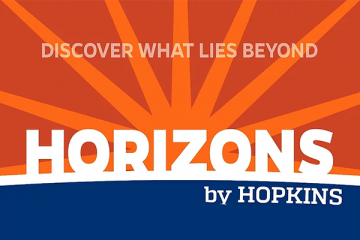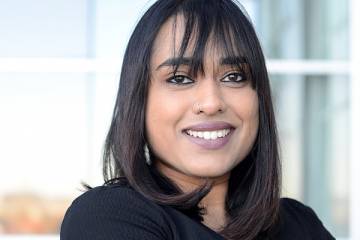Lubna Azmi sees herself as a laidback person, but even she isn't immune to the pressures and anxieties that come with planning for the future.
"I've seen how fast people's professional lives can fall apart, especially during the pandemic," says Azmi, who is a second-year international studies and sociology major at Johns Hopkins. "During quarantine, I was asking myself, have I been too selfish thinking about doing what I want to do? Should I be thinking about how to better support my family, including the family I create in the future?"
So when her academic adviser reached out about a pilot program called the DEI Collective that connects students with paid internship opportunities, Azmi applied with a sense of relief and excitement about exploring career options—while being compensated for her time. She says the collective opened her eyes to the breadth of professional opportunities available to her. She applied to five companies, including a consulting firm, an international nonprofit organization, and an advocacy group specializing in election observation and voter education.
"There were a lot of options, and I really liked how consolidated the application process was. It made it so much easier, and there were opportunities to branch out from my usual interests," she says.
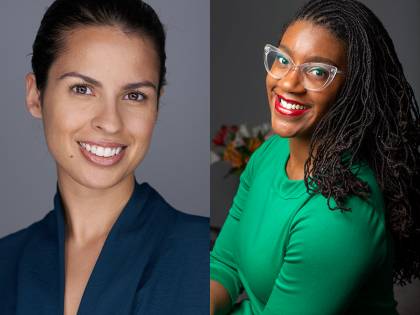
Image caption: Alia Poonawala (left), executive director of Hire Hopkins, and Alayna Hayes, senior director of life design for diversity, equity, and inclusion
A collaboration between teams within the Office of the Vice Provost for Integrative Learning and Life Design, the DEI Collective is a program that serves students from backgrounds that are underrepresented in higher education and in the broader professional workforce, including students from racial and ethnic minority groups, students who identify as LGBTQ, students with disabilities, first-generation college students, and students from families with limited incomes. It connects them with paid internship opportunities with partnering employers who are recruiting diverse job candidates.
"We noticed that companies wanted to hire diverse interns, but they were struggling to rethink their approach to recruit those desired candidates," says Alia Poonawala, executive director of Hire Hopkins, which leads employer development across Johns Hopkins' divisions and works to establish internship and employment pipelines for students. "So we created the program for them."
With expertise and input from Alayna Hayes, senior director of life design for diversity, equity, and inclusion, Poonawala laid the groundwork for the collective by recruiting potential employers first. Companies were vetted for their alignment with student interests and their commitment to the tenets of the collective, which stipulated, among other requirements, that the employer would hire at least one intern for the summer in a paid position lasting at least five weeks. Employers are also expected to attend diversity trainings and follow guidelines that ensure the internship will be fulfilling for the interns and employers alike.
"It was important to us that we set the companies up to create an environment for success for our students. We have to be good stewards of their time and their efforts," Hayes says. "Often we were finding employers thinking of diversity solely in terms of racial and ethnic diversity, and we understand that diversity extends beyond that and can include various intersections of identity. So it was really important to us that we create true partnerships with employers before we send them our students. We want to work together to ensure the outcomes are beneficial for everyone involved."
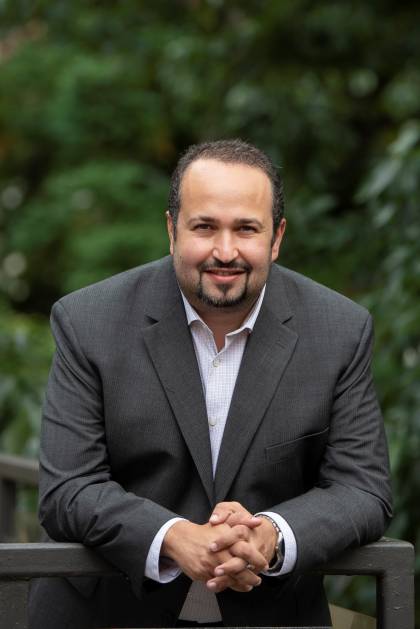
Image caption: Vice Provost for Integrative Learning and Life Design Farouk Dey
Poonawala and Hayes aimed to recruit 10 employers, but received applications from nearly 300. After a review, they expanded the pilot program to include a total of 52 employers—including the Washington, D.C. Board of Education, investment management giant T. Rowe Price, online retailer Wayfair, and breakout social media platform TikTok—with a total of 102 paid internship opportunities. A total of 469 students submitted 3,785 job applications, and more than 150 group interviews were conducted in January. Companies are still reviewing candidates and have until the end of February to make their offers.
The Life Design team, who have been charged with reinventing how Johns Hopkins approaches career services for students, is thrilled that the pilot program has made such a splash for students and employers alike. When the coronavirus pandemic forced many employers to cancel summer internships last year, the team had already been brainstorming for weeks ways of removing barriers to meaningful, immersive experiences—such as internships and research opportunities—to students whose plans might be disrupted by COVID-19.
"The pandemic accelerated a lot of things that already needed to happen to support students—these were things we were already moving towards," Poonawala says. "We knew it's not enough to continue with the way things are going—we have to actively create initiatives that empower and support our students, especially those who may be disproportionately affected by the pandemic."
Adds Vice Provost for Integrative Learning and Life Design Farouk Dey: "The mechanics and infrastructure for our new vision and strategy were already in place by the time the pandemic reached us. We've been laser focused on closing the equity gap in career outcomes, especially for our most vulnerable students. The early investments and decisions we made have allowed us to press on the gas rather than pivot."
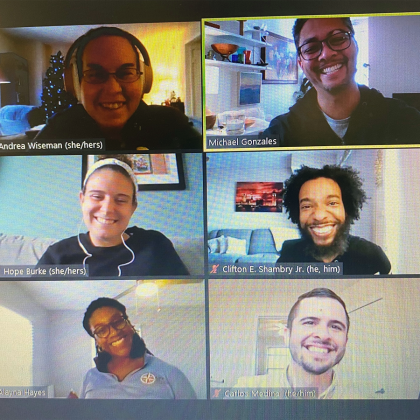
Image caption: The SOAR team in the Life Design Lab ensures all Johns Hopkins undergraduate students, regardless of race, ethnicity, socioeconomic background, or social influence, have access to resources to build fulfilling careers.
Image credit: Courtesy of Alayna Hayes
The DEI Collective builds on the diversity and inclusion commitments of SOAR, a unit of the Life Design Lab that Hayes oversees. Established as part of the $1.8 billion gift from philanthropist and alum Michael R. Bloomberg, SOAR seeks to ensure all Johns Hopkins undergraduate students, regardless of race, ethnicity, socioeconomic background, or social influence, have access to resources to build fulfilling careers.
Specifically, the team focuses on ensuring students have access to meaningful co-curricular opportunities such as mentorship and immersive academic and professional experiences. Exposure to these opportunities, Hayes says, can be especially transformative for students from underrepresented backgrounds, but these students also disproportionately face barriers to those experiences, such as lack of funding, lack of prior knowledge about the opportunities that exist, or lack of social influence to get involved. By connecting students with mentors, bolstering employment pipelines for diverse students through the DEI Collective, and providing funding through grant programs like SOAR's Summer Plunge Grant, the team aims to ensure all Johns Hopkins students have equitable access to the experiences that lead to better career outcomes.
"Students from underrepresented backgrounds can face barriers to pursuing their life's purpose. Creating additional resources and specific programming to support these students is what SOAR is about," Hayes says.
For DEI Collective student participant Lubna Azmi, the experience has already paid off in terms of interview experience and exposure to the different types of jobs available to her. And she got some happy news—she's been offered an internship at her top-choice employer for the summer.
"A weight has been lifted off my shoulders," Azmi says. "I'm really excited to get this new experience and getting to learn how else people are making positive differences in the world."
Applications for SOAR's Summer Plunge Grant open in March. Learn more online. For opportunities with Hire Hopkins, email hire@jhu.edu.
Posted in Student Life
Tagged internships, integrative learning and life design, farouk dey, soar, hire hopkins





